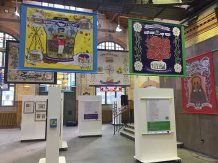articles

The banners were created with those living with dementia and their carers to express their experiences
Online exhibition and new book celebrates art made by people living with dementia
An art project involving people living with dementia has led to a book as well as an art exhibition that has been moved online to be enjoyed by all during lockdown.
In the Unfurlings: Banners for Hope & Change project, a trio of well-known artists worked with groups of people to create banners with those living with dementia to create banners that express their experiences and highlight ways of enabling them to live as well as possible with dementia.
Photographer Ian Beesley, poet Ian McMillan, and cartoonist Tony Husband worked with people living with dementia and their carers to create the banners as part of the ‘A Life More Ordinary’ project which originated from research at the University of Exeter.
Through the project, the artists have worked with a number of groups of people affected by dementia around the country, including Exeter, Kent, Oldham, York, Leeds, Bradford and Scarborough, taking a different approach in each area tailored to the group. The banners are now featured in an online exhibition at The Harris in Preston whilst a book is being released to celebrate the success of the project.
The book, released in April, celebrates the stories behind the banners and the impact the project has had on people living with dementia and their families.
Ian Beesley said: “It’s been such a rewarding project to work on to really help people living with dementia express their way of life and how to live better through art. To see the project culminate with an online exhibition and a book is fantastic. The project has made a profound impact on those who participated and I hope it can inspire others to support actions in improving life for those living with dementia.”
‘A Life More Ordinary’ is a project led by Professor Linda Clare at the University of Exeter, in collaboration with Innovations in Dementia, and funded by the Economic and Social Research Council. It is part of the IDEAL research programme – which stands for Improving the Experience of Dementia and Enhancing Active Life. IDEAL is funded by the Economic and Social Research Council, the National Institute of Health Research (NIHR), and Alzheimer’s Society.
Professor Clare said: “These banners are inspirational and deeply moving. It’s wonderful to be able to see them exhibited online while the planned series of exhibitions is on hold due to COVID-19, alongside the release of the book. The concept of banners for hope and change grew out of the incredible work that the artists and the groups of people with dementia taking part have done together to create visual imagery that challenges the public perception of dementia as a downward spiral from diagnosis. The messages resonate with the evidence from our research about what enables people to ‘live well’ with dementia. I hope people will view the banners and ask themselves whether they can understand the needs of people with dementia better, and help to improve the experience of living with dementia.”
Caroline Alexander, Curator at The Harris, said: “The Harris is delighted to be part of The Unfurlings project. It's been wonderful working with the team at our local Alzheimer's Society and an action group called Focus on Dementia. Although it is sad that many events linked to the exhibition couldn't go ahead because of the health crisis - we were delighted to put lots of content online and being part of this project has been a wonderful experience for us all."
You can follow the latest updates on dementia research @ExeterMed on Twitter with #ExeterDementia and follow the dementia news page.
Date: 12 June 2020
